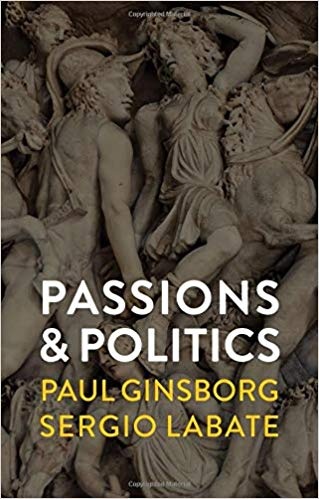This is the last article you can read this month
You can read more article this month
You can read more articles this month
Sorry your limit is up for this month
Reset on:
Please help support the Morning Star by subscribing here
Passions and Politics
by Paul Ginsborg and Sergio Labate
(Polity, £15.99)
OPTIMISTIC, but not reassuring, Paul Ginsborg and Sergio Labate’s Passions and Politics maintains that politics can be more than “a mere experience of frustration” but only if we let go of cherished beliefs and develop a new critique of neoliberalism.

Well-formed logical arguments are always essential to political persuasion but we will need something more than rationality to challenge the seductive power of consumerism. The authors fling down a political gauntlet: we must, they claim, reflect on the rise of right-wing populism and consider whether its appeal to emotional values can be redirected towards progressive objectives.
They don’t suggest that we “repurpose” the rhetoric of Nigel Farage and Tommy Robinson but rather call for an investigation of our moral landscape and passions, loosely defined as things that excite us in our daily lives.
The book hypothesises that the resurgence of populism on the left and right has been fuelled by neoliberalism’s contempt for a broad range of human values and emotions. It identifies combinations of passions that seem contradictory but reinforce each other — ambition and temperance, gentleness and steadfastness, curiosity and respect for privacy — and argues that political engagement cannot be sparked by the content of ideas alone.
Rather, activists and voters must be gripped by a deeply felt “moral and emotional core” of policies. The success of Jeremy Corbyn in rebuilding Labour as a party of democratic socialism provides some evidence in support of this idea.
This is a timely publication because there’s a growing acknowledgement that serial crises of democratic consent can only be avoided through the creation of narratives of hope, based on feelings as well as thought.
An essay by journalist Paul Mason suggests that we may come to be grateful that the radical left has crafted an “emotional narrative with an inspirational core offer.” His short piece provides concrete examples which help unlock some of the more detailed claims advanced by Ginsborg and Labate.
This is useful because, in spite of its focus on emotional commitment and the creation of accessible ideas, Passion and Politics presents some highly abstract assertions and makes for strenuous reading.
That may be unavoidable. In establishing the feasibility of their counterintuitive model of political engagement, the authors first explore the idea of an “alphabet of passions” that play out in our lives which, they explain, is a tall order as notions of good and bad are not clear cut and our understanding of specific emotions changes over time.
The final segment of the book suggests that the hostile emotions of neoliberalism tend to trigger the persecution of local and international scapegoats. Blending reason with passion can, the authors claim, prevent this, increase democratic participation and cut inequality.
While Passions and Politics is a stimulus for reflection rather than a call to action, it is essential reading for anyone concerned about the media’s use of fear and resentment to nudge the political agenda to the right.










